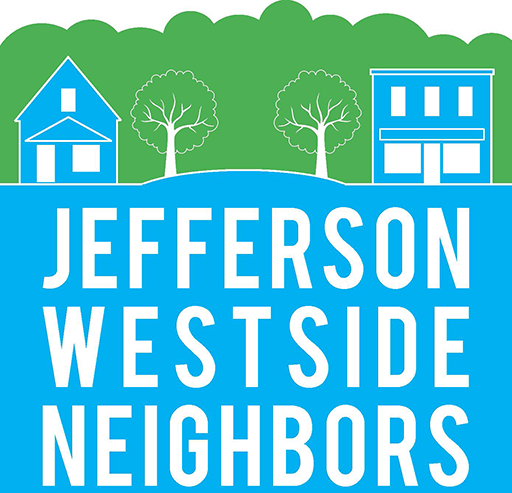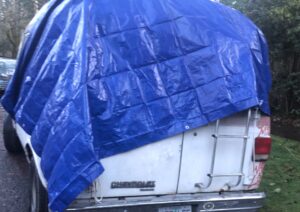Limited Residential Parking Permit (RPP) Zone Approved
The Monroe Park now has a two hour parking/tow away zone on its frontage. The RPP was approved twice and was supposed to be operational in early 2023. We are currently trying to Parking Services to move forward on it.
Parking Services has changed its rules to allow for smaller RPP zones that do not have to be self-supporting as long as they near other zones, so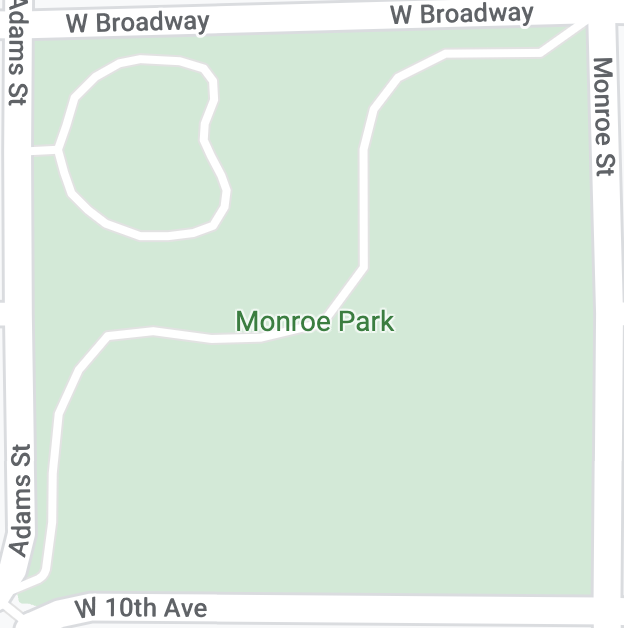 most of downtown.
most of downtown.
The voting across the larger proposed RPP lacked coherency – there was no clear consensus on contiguous streets to be included/excluded which would make creating a zone impossible. Neither the JWN or parking services wanted to draft people into the zone when there was not clearer support in a given area. However, Parking Services changed its rules to allow for smaller RPP zones downtown (near other zones) that do not require them to be self-supporting. The city is also proving more support to Parking Services since so much has been asked of them during COVID.
The one area with clear support was around Monroe Park, ironically, we had asked for a limited zone here back in 2019, but back then we were told it was not possible.
Monroe Park RPP and 2 Hour Parking Zone
The streets directly facing the park (W. Broadway, Monroe, Adams, and W. 10th) will have standard permit parking at the base rate of $40 per year (see below for how this works). All houses in the zone will be notified by mail.
The Monroe Park frontage has a 2 hour limit.
Permit and timed parking rules are enforced separately from standard parking rules. There is no notification/warning period – any vehicle parked without a permit will get cited (after 3 hours). Any vehicle parked beyond two hours on the Monroe Park side will get cited. We will be part of the regular patrol route, as opposed to complaint driven. Although, complaints will get faster service.
Expansion
The streets directly facing Monroe Park are attractive for long-term and problem parking because of the ease of access and, on park frontage, no homes. There is very little evidence of these sorts of uses being pushed down nearby streets. However, if problems do arise, and if a majority of neighbors approve, the zone can be easily expanded in one block increments.
Archived
Residential Parking Permits (RPP) Zones – Arguments for and Against
The 14 months of neighbor input and JWN research on the proposed RPP Zone (see map below) showed broad enough support to put it to a vote. Still, some neighbors are opposed on a variety of grounds on cost, concept, and negative impacts on certain people.
Several Neighbors have recently contacted the JWN to express their concerns about an RPP Zone, mostly due to its perceived impacts on homeless car campers.
We invited people to submit their concerns and two neighbors responded
AgainstNot All Residents in FavorBy Elizabeth Grant (co-signed by Steve and Cindy Leonard)(lives inside the proposed RPP Zone) The article in the recent JWN printed newsletter expressed support and excitement about the upcoming proposed JWN parking program. Yet not all residents are in favor. While there is empathy with the concern of residents, particularly those who live around Monroe Park to vehicles that are often parked for days and may have people sleeping in them, there are reasons to oppose this parking program. Charging a fee for residents to obtain a permit to park and ticketing those who park without a permit is a Band-Aid which does not solve the underlying issue. There are many, many residents in Eugene with no place to safely and comfortably exist. Pushing unhoused residents out of JWN into surrounding neighborhoods is a “sweep” – no different than the sweeps that are occurring over and over again in Eugene to close down camping and car parking in one location, only to have them pop up in another. What an incredibly poor use of our tax dollars. The adage of owning a boat comes to mind. A boat is a hole in the water you pour your money into. Until we push the city to locate legal and safe locations for all unhoused residents to park or camp, we will be in an endless cycle of pouring our tax dollars down the drain. Giving tickets and fines to the unhoused is often futile. Most will not be able to pay the fines rendered and their ticketing history only creates a bigger wall to scale in order to An alternative solution to the parking issue is for JWN to join in a sustained effort with the city to locate safe and legal places for unhoused residents to park and camp until enough affordable low income housing can be created. Meter Maids [sic] Will Not Solve Poverty or HomelessnessBy Heather Marek, Ph.D, J.D. An Abuse of Parking Enforcement To evaluate whether a residential parking permit zone makes sense, we must identify the problem that neighbors hope it will address. The primary reason stated is homelessness. JWN’s website explained, “Is this really a Problem? Yes, residents have had people living in vans and RVs in their front yards for weeks or longer, often using their parking strip as their front porch, toilet, and garbage dump. …Getting the city to move these campers can be a long and convoluted process.” Permit zones are inappropriate for that purpose. They are intended for parking scarcity and traffic congestion (only the university and downtown areas have them). Research conclusively shows that fines and displacement neither mitigate homelessness nor its community impacts. Parking enforcement is a crude and ill-suited tool for this complex problem. Unnecessary: Neighbors Can Already Report Problems The City Code is replete with laws addressing parking issues. It imposes time limits and prohibits overnight “camping.” Residents can report concerns for enforcement. Given its limited added value, the permit zone simply is not worth the costs. Harming Vulnerable Neighbors A permit zone will disrupt and stigmatize neighbors sheltering in vehicles from the elements, COVID-19, and victimization. Forcing people to move along undermines community health and safety. The CDC and OHA advise unsheltered individuals to remain in place due to heightened risk of infection, serious illness, and community spread. Parking fees and fines will make life harder for struggling neighbors. Permits cost $40-$600 annually (the City decides the amount, which remains TBD). That cost is a substantial barrier for someone out of work and behind on rent receiving $234 in food assistance. Overstaying a two-hour time limit can result in fines up to $100. Fines quickly double and then go to a collection agency where interest accrues at exorbitant rates. Ironically, permits can be denied due to prior citations. The cycle repeats, debt snowballs, and economic hardship deepens. Enforcement will humiliate and shame unhoused neighbors. Proponents contend the permit zone “is not anti-homeless” because enforcement occurs in the day and people can “arrive in the evening.” But, as JWN advertised, Eugene Code separately prohibits such overnight “camping.” Moreover, proponents fail to explain where folks should go during the day or why they are unwelcome in communal spaces. Don’t Succumb to Fear and Stereotypes The truth of the matter is that an increasing number of people—individuals and families—are residing in their cars due to the pandemic and related economic recession. As JWN news previously acknowledged, they are overwhelmingly good neighbors. Proponents paint a scary anecdotal picture to justify a permit zone. I invite you to reflect upon whether that accurately depicts your interactions with unhoused friends and neighbors, and what evidence you have seen that this is a widespread phenomenon. Good policy is based on broad patterns, not isolated incidents and “bad apples.” We should not rely upon dehumanizing stereotypes and generalizations to enact wide-sweeping policies that penalize neighbors for surviving in their vehicles. Neighbors Supporting Neighbors: Let’s Be the Model Neighborhood We all agree that homelessness is a significant problem which negatively impacts the entire neighborhood. Let’s seize this opportunity to collaborate on creative solutions that elevate the whole community. |
In FavorThe Least Worse OptionBy Ted M. Coopman, Ph.D., Chair, Jefferson Westside Neighbors We resisted this for a long time and only came to an RPP when we had exhausted all other options to decisively deal with the serious problem of long-term car camping. An RPP Zone is not designed to “solve” homelessness [see our significant efforts in that regard], it is designed to address serious and persistent problems associated with long-term car camping as well as street safety issues (see this page). Travis Hagritt of ePark informed us that RPP Zones greatly reduce or eliminate long-term car camping. While it is true there are vehicle dwellers that have little to no impact on the neighborhood, the RPP Zone will not substantially impact this group because (1) this group generally moves nightly and camps lightly (2) there is no enforcement between 6pm and 9pm and (3) it allows for 3 hours of permit free parking. We reject the argument that having to move a vehicle is an undue burden. However, what is an undue burden is the impact of long-term car camping on neighbors. In our experience, these campers are much more likely to accumulate trash and debris outside their vehicles, act aggressively toward neighbors, defecate and urinate on public and private property, engage in illegal activities, and make noise at all hours. In many cases, vans and RVs become “club houses” where groups meet and party. Problem vehicle camping has a significant impact on the JWN and requires many hours of intervention to mitigate under current city enforcement rules (rules that have changed four times in the past 12 months), which makes it frustrating for neighbors who do not know what to do. Further, these campers often wait until their vehicles are “orange tagged” and then simply move a block or two and then the whole process starts over. Some campers have been reported dozens of times. Here is one unfortunately typical example.
This van parked in front of a neighbor’s home. They are a family of four, the parents are a firefighter and an elementary school teacher with two little girls. Like most firefighters, the father is often gone days at a time. He caught these car campers using his yard as a toilet multiple times (his calls to EPD non-emergency dispatch drew no response). Under current rules, he had to wait 72 hours to report the vehicle. It then takes several days for parking enforcement to come out to inspect the vehicle, another day or two to chalk and tag it, and then several more trips (even weeks) before it would get towed. It was 10 days from arrival to departure, which may not seem long to some, but was an eternity for this family and this was not their first experience with long term campers. It was the neighbor who had to clean up the human waste in his yard. Since the van owners (like many long term campers) know the system, they wait a few days after it gets tagged before moving to another spot in the front of someone else’s home and it starts all over again. Under a RPP zone the vehicle would have been ticketed the first day. This provides a powerful disincentive for these types of problem car campers.
|
Overview
Visit the City of Eugene’s Residential Parking Permit web page
One of the top complaints from neighbors is problematic vehicle-based behaviors: long-term car camping (in excess of 72 hours); abandoned vehicles; and remotely stored vehicles (by non-residents); and unsafely parked vehicles (wrong way parking). These problems require a high degree of intervention to get the city to take action and consume a disproportionate amount of Board time. Enforcement and mitigation are slow due a variety issues with how the law and city code work as well as insufficient resources. A RPP zone can solve these issues by having dedicated parking patrols during the week. Instead of a patchwork of complicated rules and jurisdictions, vehicles that are parked for over 3 hours without an ePermit (tied to the license plate) are cited and appropriate actions taken. The violation is via the lack of a permit, not any underlying issue.
Pre-COVID, residents around Monroe Park started investigating an RPP program and Travis Hargitt (Parking Services Operations Manager among other positions) has attended two General meetings. As part of this process, the city runs-the-numbers to see if a RPP Zone is economically viable. Based on an estimation of 80% of people buying permits, the city calculates the level enforcement and the size of a RPP required to pay for itself. RPP zones do not generate extra income via fines or fees, they just need to pay for themselves. Based on these calculations, we have expanded the size of the proposed RPP in order to keep the cost at the minimum of $40 per vehicle per year ($3 per week). Short term permits for non-residents are available and you can get up to five permits per lot.
Is this really a Problem?
Yes, residents have had people living in vans and RVs in their front yards for weeks or longer, often using their parking strip as their front porch, toilet, and garbage dump. There is often crime and late-night noise involved. Getting the city to move these campers can be a long and convoluted process. However, since enforcement is during business hours, those who simply need a place to sleep in their vehicles that arrive in the evening and leave in the morning won’t be impacted. An RPP zone is not anti-homeless, it simply prevents the worst behaviors.
Abandoned cars and vehicles simply left stored for convenience in the JWN by non-residence can take months to cited and removed. Wrong way parked vehicles are serious safety issue, especially for cyclists, as people are not expecting vehicles to being moving against the flow of traffic.
Facts
The permits pay for the patrols and signage. Citations comprise less that 20% of revenue.
Why Consider a Permit Zone?
- Parking control officers do not ordinarily patrol areas without a permit zone because the zone pays for the officer’s time. So, parking rules are more evenly enforced, which improves street safety.
- Permits eliminate multi-day car camping, but do allow for “one-and-done” overnight sleeping in vehicles because there is no overnight enforcement. This mitigates problematic car camping behavior while not burdening respectful campers.
- Permits eliminate “remote storage” of vehicles.
- Permits expedite the removal of abandoned vehicles.
- Permits create a cost for what might be an extra vehicle, thus encouraging people to donate or sell it.
- Permits encourage people to use available off-street parking, thus freeing up on-street parking for guests and those with no other options.
- Residential on-street parking is a benefit that is paid by all but used by just some.
Issues with Permit Parking
- Costs: Even a minimal cost is still an extra expenditure, which can be an added burden for low-income residents.
- Hassle: Having to take the time to get a permit and renew it.
- Equity: If you have no off-street parking where you live, you are forced into buying a permit whereas those with off-street parking do not.
Final Proposed Zone
A neighbor (wanted to be included) pointed out that the original proposed zone stopped just one block west of the JWN boundary (something we had not noticed) so it seems reasonable to just expand it to the border.
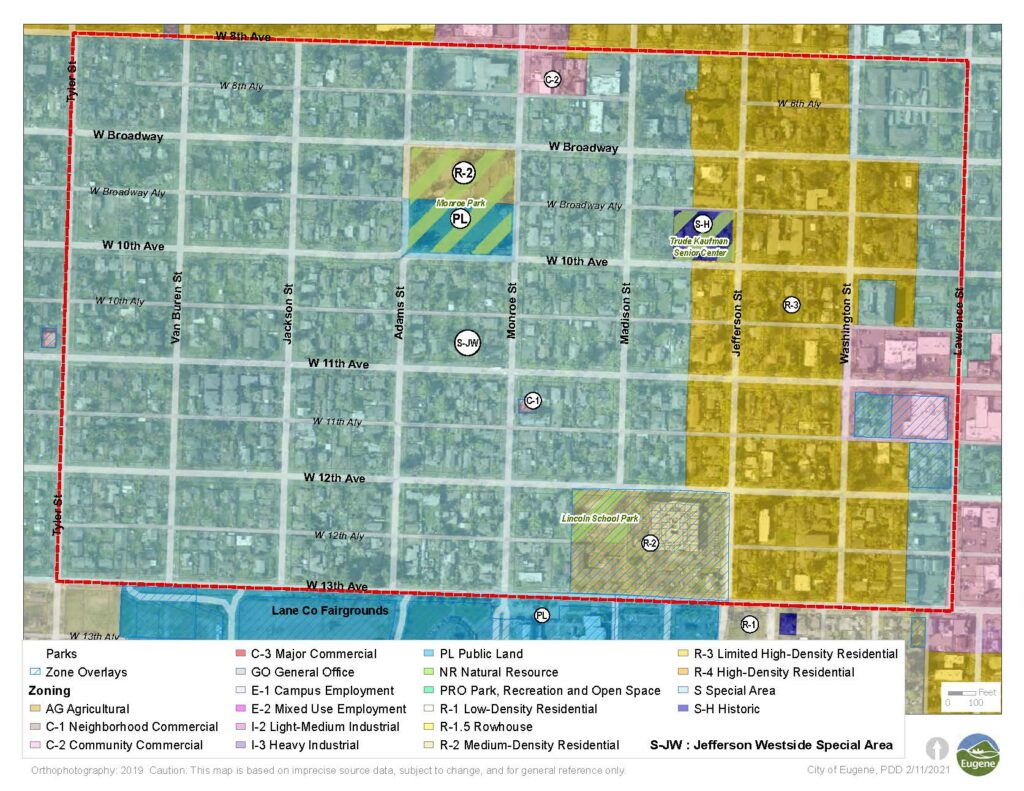
Original Proposed Zone Area
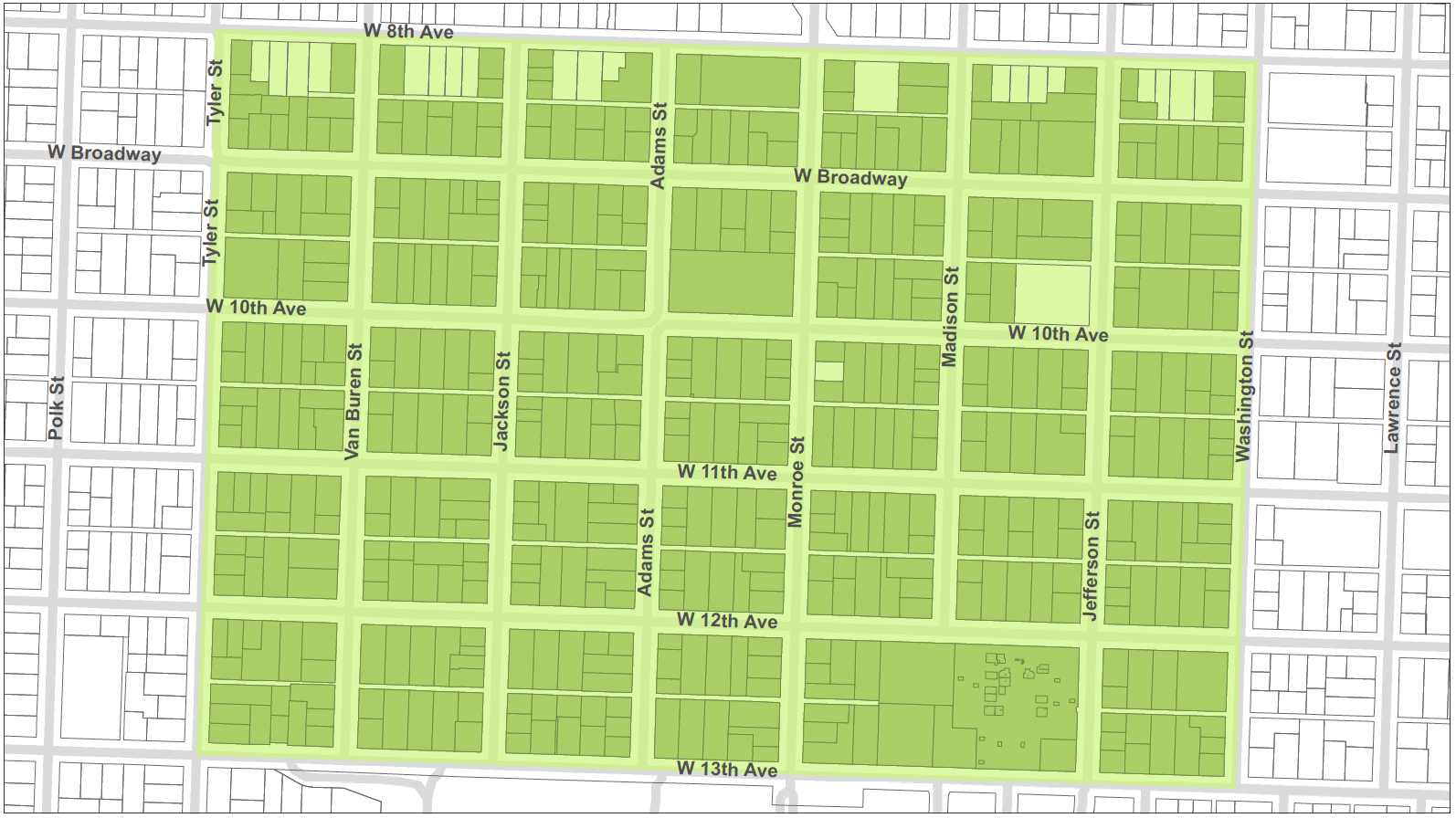
Proposed/rules based on city standards
- Days per week: Monday through Sunday
- Hours per day 24: enforced 8-6 (approximately) Monday-Saturday (may expand). You can park over-night and as long as you are gone by 9 you are okay.
- Free parking no permit: 3 hours
What does it cost?
- $40 per permit per year (currently)*.
- That comes to: .18 cents per day, .76 cents a week, or $5.33 a month
Who can get a permit?
- You must be able to prove residency (same requirements as a library card)
- Residences and permits are determined by tax lot
- The process is 100% online (no stickers/based on license plates).
How does it work?
- Maximum of 5 yearly permits (can get two year permits on request for homeowners or long-term renters [4+ years]) per tax lot.
- *You can assign up unlimited vehicles per permit, but only one can use it at a time. For example, if you have two cars and one off street parking spot, you can share one permit for both cars.
- Up to 30 single day use permits per month (free) per tax lot. You can assign as many single-day permits at a time (so a guest that stays for a week would use up 7 single day permits)
- More than a single day guest permit or over the 30 permits may be obtained by calling. For example, a free service permit for contractors or home healthcare staff based on the contract.
How does the process work?
- Tentative boundaries are submitted to Parking who calculates if the zone is financially viable (pays for itself via permits).
- Basic rules are proposed.
- All residences are notified via postcard within the proposed zone + 2 blocks in every direction.
- Eligible residents and owners vote via an online portal.
- Lease holders (on contract) get half a vote (if 5 people, they get ½ vote)
- All Lease holders (on contract) in multifamily dwellings + get half a vote.
- Dwelling owners get half a vote.
- Owner occupiers get a full vote.
- Half vote if house on corner for each street.
- The vote is simple majority but technically advisory, the traffic engineer has the final say based on set criteria if the vote is close.
What if I don’t want to be in the permit zone?
- Before the zone is established you can file a request to be exempted. However, this means the street in front of your property will be clearly excluded from the zone by signage so if likely to attract a lot of vehicles. No recommended.
- Area directly outside a permit zone tend to get bigger parking impacts.
Neighborhood Notification Timeline
- The RPP has been in discussion since 2019.
- Travis Hargitt CPM, Operations Manager/ Parksmart Advisor, City of Eugene Parking Services, presented at the November 2019 General meeting
- A detailed discussion (pro-and con) was in the November 2019 eNews.
- A detailed article, “Residential Parking Permit Zones: The Upsides & Downsides,” was in the Winter 2020 newsletter mailed to every JWN address.
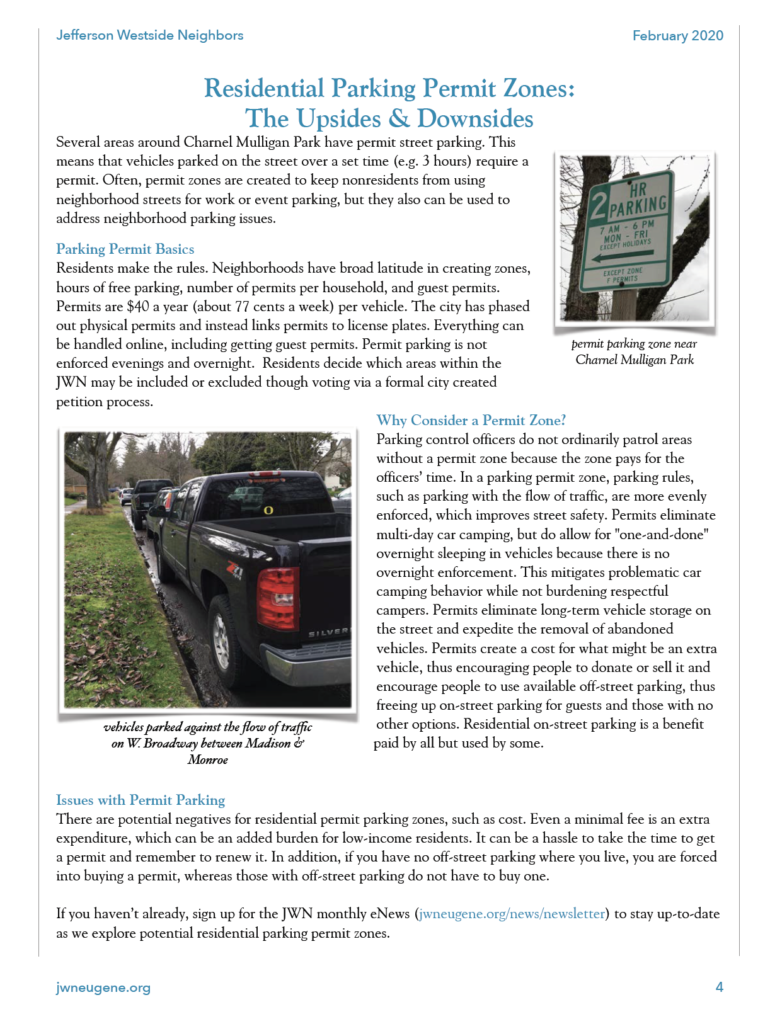
- Hargitt was back for the June 2020 GM.
- It was also discussed in the September (survey link posted), October, November, December 2020 eNews; in the January 2020. Also posted via social media and on NextDoor. We reported survey responses in the September GM meeting.
- Survey: The turnout was low (50) and results mixed so it did not tell us much. It asked neighbors both inside and outside the proposed RPP zone (note the proposed zone was initially smaller) if they supported or opposed it. Inside the zone 19 supported and 21 did not support it. Eight people within two blocks of the zone supported it and none opposed.
- Due to cost considerations and demands, the proposed RPP was slightly expanded first to Washington in the east and then to Lawrence to take us to the edge of the JWN (as that seemed to make the most sense), also on the south from 12th to 13th and from Van Buren to Tyler in the west.
- The proposed RPP zone has been slightly expanded to include the block between Washington and Lawrence – since there was only one block left out in the east and based on neighbor interest – we decided to expand to our border.
Existing JWN RPP Zones
Existing RPP
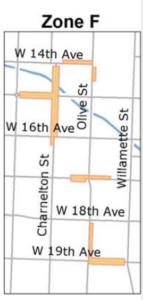
I hope everyone appreciates what it took to get this implemented and the benefits of the parking program. We did our block about 8 years ago and it has meant no more long term storage of vehicles (nearby apartment charges for parking), far fewer stolen cars dumped, and much less long-term car camping. Thanks you to the JWN board for navigating this for the neighborhood association.
Rene Kane
We have had the Residential Parking Program on our block for many years and it’s a small price to pay for reducing the number of cars stored on our street, especially when the neighboring apartment building charges its tenants for parking. It has reduced the number of cars stored long-term, reduced illegal car-camping and made it easier for friends to visit (back when “visiting” was something we could do). It’s been especially helpful for friends who have kids, mobility issues or those lugging a lot of stuff, to have available parking nearby.
